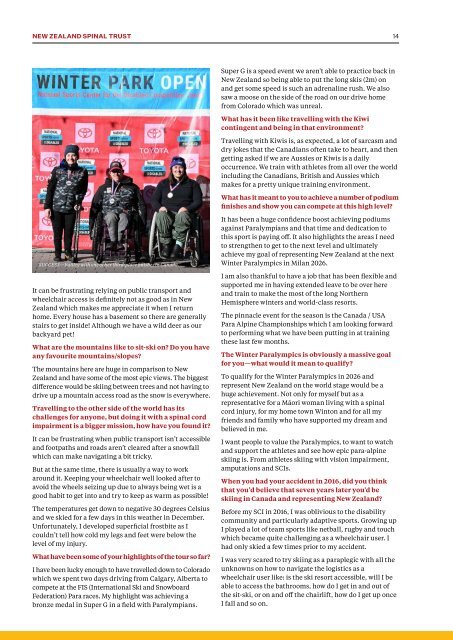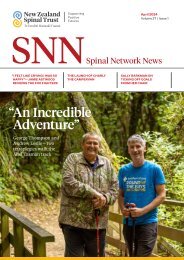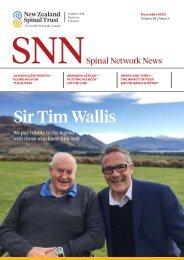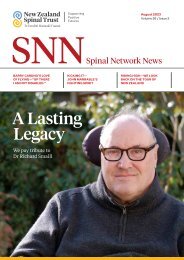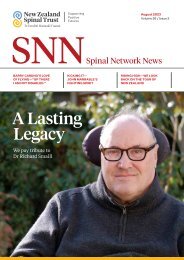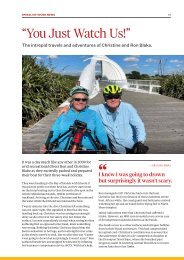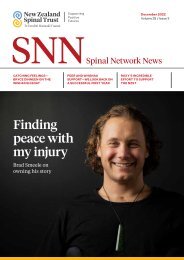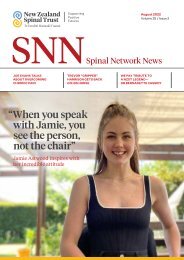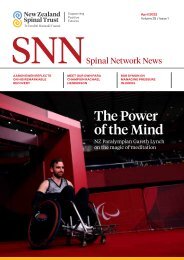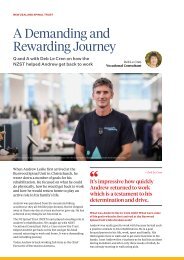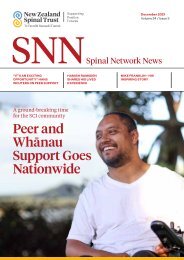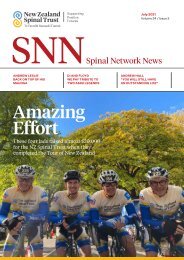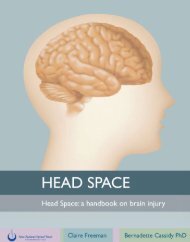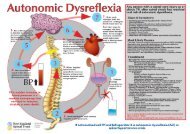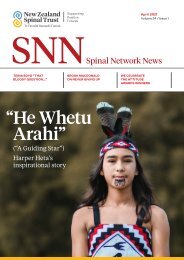SNN_April 2023 Issue_web
Create successful ePaper yourself
Turn your PDF publications into a flip-book with our unique Google optimized e-Paper software.
NEW ZEALAND SPINAL TRUST 14<br />
Super G is a speed event we aren't able to practice back in<br />
New Zealand so being able to put the long skis (2m) on<br />
and get some speed is such an adrenaline rush. We also<br />
saw a moose on the side of the road on our drive home<br />
from Colorado which was unreal.<br />
What has it been like travelling with the Kiwi<br />
contingent and being in that environment?<br />
Travelling with Kiwis is, as expected, a lot of sarcasm and<br />
dry jokes that the Canadians often take to heart, and then<br />
getting asked if we are Aussies or Kiwis is a daily<br />
occurrence. We train with athletes from all over the world<br />
including the Canadians, British and Aussies which<br />
makes for a pretty unique training environment.<br />
What has it meant to you to achieve a number of podium<br />
finishes and show you can compete at this high level?<br />
SUCCESS—Bailley with one of her third-place finishes in Canada.<br />
It can be frustrating relying on public transport and<br />
wheelchair access is definitely not as good as in New<br />
Zealand which makes me appreciate it when I return<br />
home. Every house has a basement so there are generally<br />
stairs to get inside! Although we have a wild deer as our<br />
backyard pet!<br />
What are the mountains like to sit-ski on? Do you have<br />
any favourite mountains/slopes?<br />
The mountains here are huge in comparison to New<br />
Zealand and have some of the most epic views. The biggest<br />
difference would be skiing between trees and not having to<br />
drive up a mountain access road as the snow is everywhere.<br />
Travelling to the other side of the world has its<br />
challenges for anyone, but doing it with a spinal cord<br />
impairment is a bigger mission, how have you found it?<br />
It can be frustrating when public transport isn’t accessible<br />
and footpaths and roads aren’t cleared after a snowfall<br />
which can make navigating a bit tricky.<br />
But at the same time, there is usually a way to work<br />
around it. Keeping your wheelchair well looked after to<br />
avoid the wheels seizing up due to always being wet is a<br />
good habit to get into and try to keep as warm as possible!<br />
The temperatures get down to negative 30 degrees Celsius<br />
and we skied for a few days in this weather in December.<br />
Unfortunately, I developed superficial frostbite as I<br />
couldn’t tell how cold my legs and feet were below the<br />
level of my injury.<br />
What have been some of your highlights of the tour so far?<br />
I have been lucky enough to have travelled down to Colorado<br />
which we spent two days driving from Calgary, Alberta to<br />
compete at the FIS (International Ski and Snowboard<br />
Federation) Para races. My highlight was achieving a<br />
bronze medal in Super G in a field with Paralympians.<br />
It has been a huge confidence boost achieving podiums<br />
against Paralympians and that time and dedication to<br />
this sport is paying off. It also highlights the areas I need<br />
to strengthen to get to the next level and ultimately<br />
achieve my goal of representing New Zealand at the next<br />
Winter Paralympics in Milan 2026.<br />
I am also thankful to have a job that has been flexible and<br />
supported me in having extended leave to be over here<br />
and train to make the most of the long Northern<br />
Hemisphere winters and world-class resorts.<br />
The pinnacle event for the season is the Canada / USA<br />
Para Alpine Championships which I am looking forward<br />
to performing what we have been putting in at training<br />
these last few months.<br />
The Winter Paralympics is obviously a massive goal<br />
for you—what would it mean to qualify?<br />
To qualify for the Winter Paralympics in 2026 and<br />
represent New Zealand on the world stage would be a<br />
huge achievement. Not only for myself but as a<br />
representative for a Māori woman living with a spinal<br />
cord injury, for my home town Winton and for all my<br />
friends and family who have supported my dream and<br />
believed in me.<br />
I want people to value the Paralympics, to want to watch<br />
and support the athletes and see how epic para-alpine<br />
skiing is. From athletes skiing with vision impairment,<br />
amputations and SCIs.<br />
When you had your accident in 2016, did you think<br />
that you’d believe that seven years later you'd be<br />
skiing in Canada and representing New Zealand?<br />
Before my SCI in 2016, I was oblivious to the disability<br />
community and particularly adaptive sports. Growing up<br />
I played a lot of team sports like netball, rugby and touch<br />
which became quite challenging as a wheelchair user. I<br />
had only skied a few times prior to my accident.<br />
I was very scared to try skiing as a paraplegic with all the<br />
unknowns on how to navigate the logistics as a<br />
wheelchair user like: is the ski resort accessible, will I be<br />
able to access the bathrooms, how do I get in and out of<br />
the sit-ski, or on and off the chairlift, how do I get up once<br />
I fall and so on.


